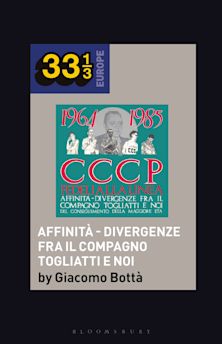- Home
- ACADEMIC
- Music & Sound Studies
- Music Biographies
- Music Glocalization and the Composer
Music Glocalization and the Composer
The Case of Franz Xaver Scharwenka (1850-1924)
Music Glocalization and the Composer
The Case of Franz Xaver Scharwenka (1850-1924)
You must sign in to add this item to your wishlist. Please sign in or create an account
Description
Music Glocalization and the Composer: The Case of Franz Xaver Scharwenka (1850–1924) examines the life, milieu, and music of composer Franz Xaver Scharwenka. Mikolaj Rykowski argues that Scharwenka held the ability to function on a global scale relatively early in music history, founding conservatories in Berlin and New York, becoming one of the first artists to record music using cutting-edge audio technology of his time, namely the Welte-Mignon rolls, and by staging his own opera at The Met. Using a relatively new methodological perspective called music glocalization, Rykowski enables us to explore the composer's cultural roots in Poland and observe how the nineteenth century global sense of nationality influenced his musical output.
Table of Contents
Introduction
1. Glocalization and Music: Theoretical Concepts
2. Ethnomusicological Perspective: Scharwenka's Identity and Early Music Experiences
3. Glocality of Music
4. Local–Global Interplay
5. Versatile Artist: Think Globally, Act Locally
Conclusion
Index
About the Author
Product details
| Published | Feb 27 2024 |
|---|---|
| Format | Ebook (Epub & Mobi) |
| Edition | 1st |
| Extent | 160 |
| ISBN | 9781666936841 |
| Imprint | Lexington Books |
| Illustrations | 20 BW Photos, 1 Tables |
| Series | Critical Studies in Historical Ethnomusicology: Deep Soundings |
| Publisher | Bloomsbury Publishing |
About the contributors
Reviews
-
Music Glocalization and the Composer: The Case of Franz Xaver Scharwenka by Mikolaj Rykowski proposes a discussion of the relationship between artistic contexts of a different scale: the pan-European, supposedly ‘universal’ context of art music and the local circumstances of practicing music within a specific, historical community. The study skillfully connects the broad, theoretical approach of social sciences, mainly sociology and anthropology, with detailed historical and musicological analysis, to show how widely accepted general rules of music-making function in unique local environment. This book by Rykowski is then an important contribution both to conceptual discussion of the ‘glocalization’ phenomenon and to the theoretically informed history of musical practices in Europe. It also brings an insight into possibilities of interpretation of individual artistic output—Scharwenka’s one in this case—within the frame of broad socio-cultural processes.
Krzysztof Moraczewski, Adam Mickiewicz University Poznan

ONLINE RESOURCES
Bloomsbury Collections
This book is available on Bloomsbury Collections where your library has access.



































